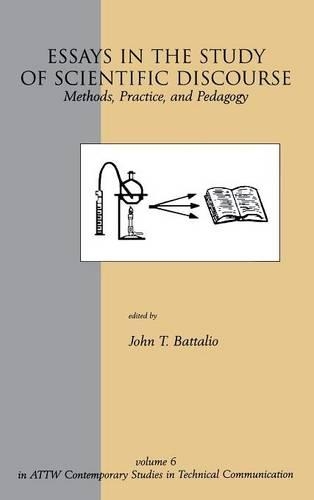
Essays in the Study of Scientific Discourse: Methods, Practice, and Pedagogy
(Hardback)
Available Formats
Publishing Details
Essays in the Study of Scientific Discourse: Methods, Practice, and Pedagogy
By (Author) John T. Battalio
Bloomsbury Publishing PLC
Praeger Publishers Inc
20th July 1998
United States
Classifications
Tertiary Education
Non Fiction
Semantics, discourse analysis, stylistics
501
Physical Properties
Hardback
272
Description
With contributions by sixteen scholars from such diverse fields as communication, linguistics, literary studies, rhetoric, and sociology of sciences, Essays in the Study of Scientific Discourse continues the contemporary discussion about the origin and nature of scientific discourse and its function in today's society. Essays document the increasing importance of rhetorical expertise in scientific discourse, shed new light into the history and language of science, and offer pedagogical guidance for teachers of scientific writing. Readers may also discover new topics for scholarly research in scientific discourse. Gay and Ted Gragson, for instance, show how technological advances may increase the rhetorical complexity of the grant proposal process, while J. Harrison Carpenter reveals the rhetorical power of the scientific report. In a related study, Cynthia Haller shows how scientific claims change as they mover from the scientific to the public arena. Dwight Atkinson gives empiricists a new methodology by integrating rhetorical analysis with sociolinguistic methodology. Richard Johnson-Sheehan and Dan Ding describe the evolution of scientific metaphor and passive voice, respectively. Ramn Plo Alastru, Carmen Ramn Plo Alastru-Llantada, and Rosemary Horowitz offer advice for teachers of scientific writing, while Steven Darian explores the intricacies and argumentative power of scientific classification schemas. In turn, Philippa Benson gives editorial advice to writers of scientific texts. Gender issues in scientific writing are addressed by Christine Skolnik and Mary Rosner. Trevor Pinch and Charles Alan Taylor put the cold fusion controversy of 1989 in critical perspective.
Reviews
[a] useful introduction to some of the major current issues in the study of scientific discourse....valuable for graduate students and for teachers of technical communication who are beginning or continuing their explorations into the nature and practice of scientific discourse.-Technical Communication Quarterly
The authors deomstrate a depth of scientific knowledge, and yet discuss science in such a way that nontechnical readers, those whose backgrounds are in the rhetorical rather than the natural, physical, or linguistic sciences can benefit from the analyses. The authors write clearly without oversimplifying the scientific principles or phenomena under discussion.-IEEE Transactions on Professional Communication
"a useful introduction to some of the major current issues in the study of scientific discourse....valuable for graduate students and for teachers of technical communication who are beginning or continuing their explorations into the nature and practice of scientific discourse."-Technical Communication Quarterly
"[a] useful introduction to some of the major current issues in the study of scientific discourse....valuable for graduate students and for teachers of technical communication who are beginning or continuing their explorations into the nature and practice of scientific discourse."-Technical Communication Quarterly
"The authors deomstrate a depth of scientific knowledge, and yet discuss science in such a way that nontechnical readers, those whose backgrounds are in the rhetorical rather than the natural, physical, or linguistic sciences can benefit from the analyses. The authors write clearly without oversimplifying the scientific principles or phenomena under discussion."-IEEE Transactions on Professional Communication
Author Bio
JOHN T. BATTALIO is Assistant Professor at Boise State University where he teaches in the Technical Communication Program. His recently published book, The Rhetoric of Science in the Evolution of American Ornithological Discourse (Ablex, 1998), analyzes the impact of language and rhetoric in the professionalization of science.
